Audio Version Of The Blog – 7/2/21
Listen to an Audio Version of the Blog
Download:MP3 Audio

Listen to an Audio Version of the Blog
Download:MP3 Audio
My new article on Linkedin “A Needless Conflict Generates Needless Victims”
The Palestinian-Israeli conflict, or as it was previously known, the Arab-Israeli conflict, is widely considered as the source of all the problems in the Middle-East. Over the past century or so, this conflict has inflicted tens of thousands of casualties on both sides, and tremendous suffering of countless innocent people. The sad thing about it is that the conflict is needless. If the two peoples acted according to their roots, there would be no conflict whatsoever, and the area would be a role model of amity.
In our roots, Jews and Arabs aren’t that far. We both come from the same father, Abraham, who taught us all the same law: the law of mercy and kindness. Abraham taught us that nature consists of one force that moves the stars in the sky and “rules the capital,” as Maimonides put it. Abraham taught us that that force is one of love and giving, and this is why he taught his disciples to love and give, as well, so they would be like nature.
The conflict began once we abandoned the principle of love and giving and gave in to the power of the ego. Once the ego has set in, religions took over where simple love once ruled. Religions thrive on separation and distinction; they set apart Jews, Christians, and Arabs, and then continue to separate them into countless sects and factions. Since the ego wants to be the king, it cannot tolerate connection and bonding. When it cannot be the sole ruler, it finds “flaws” in others, which justify parting from them. This is how new religions form.
It is true that people need traditions and cultures; it is very human and serves positive roles in people’s lives. As such, religion is not at all negative. However, when it drives people away from one another, presents others as enemies simply for wearing a different kind of clothing or for praying to the same force in a different way, then religion becomes a source of conflict and hate, and anything that increases hatred among people is negative.
Despite the apparent deadlock, I see the solution as easy, as long as people do not try to annihilate others or force their ways of life on them. To establish peace, all that people need is to consider that the one force that guides our world is good and does good, and if we want to be close to it, we should try to be likewise.
An approach of love and giving never reproaches or delegitimizes other people. Each one should live according to one’s own culture and tradition. All that we need is to add another layer, a coating of love over our diversity, above our different approaches to life. If we remember that we all have the same father, who wanted us all to have the same things, to attain what he had attained, and spread what he had discovered to the whole world, I think it will be only natural to lead a peaceful and harmonious life here in our tormented piece of land, and leave our bloody history behind, for good.
[284371]
 Michael Laitman, On Quora: “Why is human life considered the most important than the rest of the life forms?“
Michael Laitman, On Quora: “Why is human life considered the most important than the rest of the life forms?“
We need to first realize that the collective system of nature is constructed as a pyramid. The lowest layer of the pyramid is the still level. It is at the pyramid’s basis, and it includes the universe with its stars and planets.
The next higher layer of the pyramid is the vegetative level, which is all vegetation and plant life on Earth.
Then comes the animate level, which consists of all animal life on our planet, and at the top of the pyramid is the speaking level—the human being—which does not relate to the human body, as that belongs to the animate level, but to the inner qualitative aspect that makes us human.
Therefore, human life is naturally more important than other life forms and levels of nature.
This is not due to an egoistic desire for superiority. It is because we include the other life forms contained in the pyramid within ourselves. By developing a balanced and harmonious attitude toward each other and to nature in general, we will then correct ourselves and nature as a whole. For instance, ecological problems and disasters that unfold in our world are no more than phenomena that we ourselves project upon nature. This is why human life and the role of the human being in nature is of utmost importance.
We have yet to discover that our egoistic attitude toward ourselves and nature brings about disasters on the ecological level, as well as crises we experience in human society. If we undergo a specific kind of self-transformation—developing altruistic attitudes and positive connections to each other above our inborn egoism—then by doing so, we will also see how nature transforms positively. This is why we need to understand that the ecological disasters of our times depend exclusively on our attitudes toward each other and nature.
We experience such crises not due to nature shifting out of balance. Instead, we ourselves bring about the imbalance in nature at the level of our attitudes to each other and nature.
Based on a Q&A with Kabbalist Dr. Michael Laitman on September 9, 2006. Written/edited by students of Kabbalist Dr. Michael Laitman.
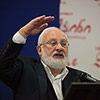 Question: A person thinks that he creates with his thoughts, that he engages in some kind of work, and that he exists. But in fact, he is in an illusion. Is there a point a person can cling to in order to get out of it?
Question: A person thinks that he creates with his thoughts, that he engages in some kind of work, and that he exists. But in fact, he is in an illusion. Is there a point a person can cling to in order to get out of it?
Answer: What do you need it for?! Why do you need to know what the meaning of your life is, what you make on your own, and what comes from above? Why do you, an egoist, want to know this too? Have you not spoiled this poor Earth enough with your egoistic knowledge?
Question: Isn’t the thought “What do I live for?”, in principle, the only thing that is important for a person?
Answer: Of course. But still, the thought will not give you anything. You will not be able to attain and reach it while you are in your petty egoistic state, only if you rise above it.
Question: Is it possible to rise above this state by relying on our thoughts, on the intellect?
Answer: No. No way! No mind, no intellect, no qualities given to you from the earthly nature is enough to get you out of yourself.
To do this, there must be an entire exit system where you part with your egoism and rise above it.
[284093]
From KabTV’s “Kabbalah Express” 6/13/21
Related Material:
Escaping Egoism
Through The Sea Of Egoism
Egoism Poisons Our Lives
 The Question of the Meaning of Life
The Question of the Meaning of Life
Question: When did you first have a question about the meaning of life?
Answer: I was born with it. It pursued me literally from childhood. I searched all the time but did not know where to find the answer. I thought that I would find it in science or something, but it very quickly turned out that as soon as you try, you see it is not for you.
There were years when I did not know what exactly I was looking for. I just felt empty, bored. What for? What can be the goal in life?
Question: How did you try to fill this void?
Answer: First, I tried to choose a profession. There were not many opportunities in Russia at the time. My parents forced me to go to medical school. I enrolled but immediately dropped out. Literally within a few months, I realized that this was not for me because it did not provide a solution for a painful issue.
But if I had graduated from this school, I would have become a surgeon because you see a clear result of your work. The patient is in serious condition and can only be helped by tough intervention, you intervene, and see the result. However, it was still not what I was looking for.
I enrolled in the Faculty of Automation and Computer Engineering at the Ulyanov-Lenin Institute in Leningrad. Then I transferred to the Polytechnic Institute in the department of Professor Akhutin, biological medical cybernetics. I was constantly looking and looking. At the same time, in my last years in Russia, I worked a little at the Institute of Blood Transfusion, at the Military Medical Academy, and even at the SKB, where they made alpha belts for astronauts. But I did not see success in this.
To be a scientist? Well, you will be an assistant professor. So what is next? It somehow disappointed me very quickly.
Question: There is some kind of boundary. You reach it, and there is no further development. And did that initially stop you?
Answer: Yes. It haunted me all the time. In some ways I was unhappy. But misfortune, as they say, helped and led me to Kabbalah after many years. I realized that I had nothing to do in science, nothing to do in Russia at all. At that time, repatriation began. For several years I covered my tracks until through my native Vitebsk, through Lithuania, through the small town of Pobrade, after two years of refusals, I received a permit and left. In 1974 I arrived in Israel.
Search in Israel
After arriving in Israel, I continued to look for an answer to the question about the meaning of life. I specifically settled next to the Weizmann Institute. I thought maybe I would find something there. Nothing again. There was an opportunity to engage in the development of medical equipment, which was closest to my area of expertise. But that did not interest me either. I didn’t want to give it my whole life. It is better to go to some kind of automatic job and be free in heart and soul.
Therefore, I went to work in the army in aircraft maintenance. And in my free time from work, I continued to search. How to find what it is worth living for? This question, this passion, this desire, the emptiness, drove me, although by this time I already had a wife and a child and I was happy in my family life. I am happy to this day that I have been living with this woman for so many years.
Nevertheless, something bothered me. I was offered to search in religion. I started going to some courses and I went to Yarkhei Kala on weekends. They seemed to be saying something, but there was no point in it. And all the time I tried to understand: “Well then, then what?” And they themselves had no questions.
I tried to become like them. I liked what they say about eternity, about the Creator, about the soul, about the connection with the eternal. But where is this connection? They answered: “We read and teach, and this is the connection.” And where is this connection really? Where is the connector with which you connect to this connection? Where do you feel it clearly? Are you involved in this yourself? “No, it is written in the books.” That was enough for them.
But I still searched until Rabbi Fischer from Holland told my trustees who wanted to make me a simple religious Jew: “He probably needs to be introduced to Kabbalists, to those who are more deeply involved in this. There are people who need it.”
And they introduced me to Rabbi Zilberman. Through him, I realized that there is Kabbalah, there are books that really seriously talk about it. He began to study with me in Aramaic on the sly. After all, Kabbalah in the primary sources is set forth in Aramaic. It originates from Babylon, where Aramaic was the spoken language.
But I was not satisfied with his approach either. Believers just study books, and he studied Kabbalah in the same way. And where is the contact, where is the connection? They were not there either. He believed that reading in order to learn more was enough.
What does “learn” have to do with it? I want to be in it! What should I do to find out the very essence of life, everything that happens around, to see the creation from its beginning to the end? Why, how, why? What is the ultimate goal?
To this, Rav Zilberman said: “The question, of course, is a good one. This is understood here and there in Kabbalah. As much as we understand the Kabbalists, that much we understand.” And I left him.
Berg
Once, in search of a Kabbalah teacher, I went to one of the lectures at the Berg Institute, but I saw that all this, of course, was not serious. Then I asked to be introduced to Berg and told him bluntly: “I am ready to pay what you want, only I need private lessons.” From a financial point of view, I was a wealthy person and really donated a lot to him, but I demanded private lessons.
So, I started going to his house almost every day at five o’clock in the morning. After a few weeks, I realized that I had nothing to do with him further.
Nevertheless, I learned a little more from him than from the others, because at one time he studied with Rabbi Brandwein, a student of Baal HaSulam. Berg told me a little about Baal HaSulam, about Rabbi Brandwein, how he studied with him when he was still very young. He said that there are still other books, the books of Baal HaSulam, and they can be used. Basically, I learned this from him.
But after two or three weeks, seeing that I had nothing more to learn from him, I stopped studying. And where to look next? Who should I look for? I did not know.
Here He is a True Teacher!
Somehow, literally by accident, after arriving in Bnei Brak, I decided to go to look for a teacher. It was winter, it was hard to travel to Jerusalem at this time of year and I thought, why not look in Bnei Brak. At one of the crossroads, leaning out of the car, I asked: “Where do people study Kabbalah here?” A religious man standing there replied: “Turn left, go to the grove, there you will find a place where they study Kabbalah.” Just like an angel from heaven.
When I arrived there I saw old people studying Kabbalah. I turned to them and they showed me a teacher. So I started studying there. It turned out that their leader was the eldest son of Baal HaSulam. Previously, no one told me about this.
Thus, I ended up with the most important person, I would say the only Kabbalist at that time. Moreover, he was the eldest son of Baal HaSulam and received everything from him. And indeed, when he began to study with me, I realized that a week or two would not be enough here.
I felt this by the way my questions did not fly somewhere into the void but immediately fell on the right ground. I was getting answers straight to the head. Moreover, not elusive answers, like be content with faith and some commandments, or we will wait and see later. They were absolutely clear, serious, calm answers. Moreover, they were accompanied with formulas, with graphs, with logical explanations, without any concessions.
This Is How I was Made
Question: Did your parents know about your search for the meaning of life?
Answer: They always knew what I was looking for. Everything happened before their eyes over the years. Naturally, they understood that I would not give up in any way and in anything because I could not live without it; it was not worth living. Therefore, they did not stop me.
At the same time, I was a serious, sane, very realistic person; I was not in the clouds. I despise mysticism and am very far from religion, from faith. I am very realistic, I know that I need to provide for my family, my children, I stand firmly with two feet on the ground, I do not succumb to any bad influences. They knew all this very well. They saw that I had a very serious goal, that I was created this way, and that I am going forward.
[282008]
From KabTV’s “Close-up. Generation” 8/24/09
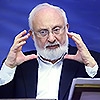 Question: The Torah says that 70 souls descended into Egypt, although we know that there were tens of thousands of people. Why are we talking about this particular number?
Question: The Torah says that 70 souls descended into Egypt, although we know that there were tens of thousands of people. Why are we talking about this particular number?
Answer: To start with, there really were not many people in the time of Abraham. The Torah always refers not to the number of people, but to the power of souls.
“70” is a complete number because our soul consists of 70 parts. If these 70 parts are connecting together and aim their personal and common efforts to Keter, to the peak of connection, then this is called “complete work,” “the whole soul,” i.e., the connection with the Creator by combining these qualities.
[284037]
From KabTV’s “Spiritual States” 6/11/21
Related Material:
70 Nations Of The World—Spiritual And Historical Interpretation
The Spiritual Roots Of Nations And Peoples
70 Different Nations Together On The Same Earth
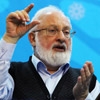 Baal HaSulam, “The Acting Mind”: His qualities are the holy Sefirot…
Baal HaSulam, “The Acting Mind”: His qualities are the holy Sefirot…
These are the same ten Sefirot that we study about and in which we exist. To the extent that I develop, I attain these attributes and I thus begin to manage my attitude to the Creator, from Malchut to Keter, and the Creator’s attitude to me, from Keter to Malchut.
And this is the acting mind that guides His world and by which He allots them His bestowal and goodness.
There are ten Sefirot: Keter, Hochma, Bina, Hesed, Gevura, Tiferet, Netzach, Hod, Yesod, and Malchut. Keter is the Creator and Malchut is me, and everything else between Keter and Malchut are my attributes.
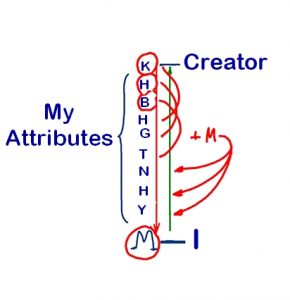
We must understand why this is called “Dvekut with the Creator,” as it seems to be mere learning.
It isn’t simply about studying the material, because by working on it we summon unto us the upper Light from Keter, which descends on to us, on to Malchut, manages us, and changes our attributes. In this state we can guide ourselves back from Malchut to Keter, and then the right bilateral connection appears in us.
[249094]
From KabTV’s “Fundamentals of Kabbalah” 4/21/19
Related Material:
“Buy” The Qualities Of The Creator
The Ten Sefirot – The Foundation Of The Creation
Between Keter And Malchut
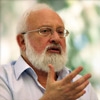 Baal HaSulam, “The Acting Mind“: It is written that every person is obliged to attain the root of his soul.
Baal HaSulam, “The Acting Mind“: It is written that every person is obliged to attain the root of his soul.
A Kabbalist who has already attained the root of his soul and is certain of it gives us a clear instruction that you, a man, must attain the root of your soul.
This is the point where the upper force relates to you, from where all systems, signals, and forces of providence descend upon you. And you must perceive everything, understand, adapt, and accordingly alter yourself, change everything for the right use.
Therefore, each person must attain the root of his soul, understand it, and correctly enter into mutual connection with it.
This means that the aspired-for purpose of the created being is Dvekut [adhesion] with His qualities, as it is written, “And to cleave unto Him.” Our sages interpreted that this is the Dvekut with His attributes: “As He is merciful,” etc.
In order to merge with the attributes of the Creator, I must not only rise, but also understand that the ascent to the level called the root of my soul can occur only to the extent that I gradually change according to the properties of the root of my soul.
This means that by changing myself more and more into resembling the Creator, I gradually ascend to the root of my soul. And once I reach it, I enter the most comfortable, perfect state, I achieve eternity and perfection.
[249084]
From KabTV’s “Fundamentals of Kabbalah” 4/21/19
Related Material:
Absolute Justice In The Life Of A Soul
Where Is The Root Of My Soul?
One Soul For All
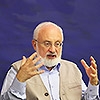 Question: There are hundreds of management approaches, but if they are integrated, then four approaches can be distinguished: administrative, scientific, industrial, and human.
Question: There are hundreds of management approaches, but if they are integrated, then four approaches can be distinguished: administrative, scientific, industrial, and human.
To what level can a parabola be applied in governance? Or is it possible to consider everything in a complex, starting from the upper level and ending with the lowest one?
Answer: It is better to consider approaches to management in a complex, because we live in one integral, interconnected nature. But since we are such selfish, scattered, individual personalities, we do not see the integral existence of the entire system.
The system is one, nature is one. As it arose from one design of creation, from the Big Bang, it develops from one source.
Nevertheless, we see nature in the form of scattered systems because we divide it according to our small mental, psychological capabilities because they are not interconnected.
But as soon as we start to unite into a common system, say, even in a ten, then we will have a completely different approach, a view of nature, and we will perceive it as an interconnected system in which there is no division into psychology, zoology, and everything else. It is one common whole.
Therefore, dividing management into people, machines, programs, resources, etc. is completely wrong. Now we do this in view of the weakness of our approach. But if we master the integral approach, we will see in it an absolutely complete interaction of the entire system.
It will be described by the same actions and equations, no matter what is meant by them: either a technological process, the flow of some resources, or the combination of society’s schedules. It does not matter. This is all one common whole, like in the body, one organ cannot stand out from the others, it is still tied to the others and works together with them.
Therefore, a real control system should include everything and not be the sum of various subsystems. I think we will reveal this as one whole.
[283816]
From KabTV’s”Science of Management”
Related Material:
Becoming One System
Assembling A System Of Separate Desires
Together In One System
Preparation to the Lesson
| [media 1] | [media 2] |
Lesson on the Topic “Raising Ourselves”
| [media 3] | [media 4] |
Writings of Baal HaSulam, “Introduction to The Book of Zohar, Item 14″
| [media 5] | [media 6] |
Selected Highlights
| [media 7] | [media 8] |